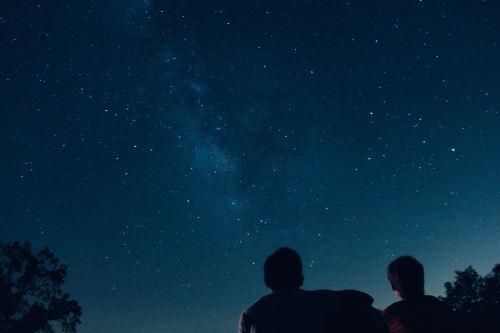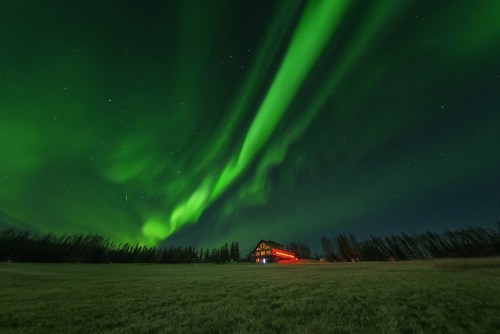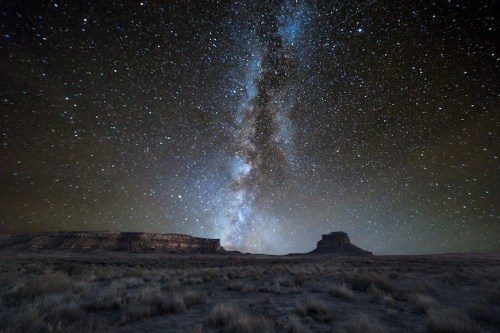Spend your star-studded astrotourism getaway at one of these 4 US destinations
Astrotourism is an IRL trend, Airbnb reports. And, you don't even have to leave the country to see the stars. Check out four spots for stargazing travel.

Astrotourism is basically the JOMO of wanderlusting vacations—there’s very little to do beyond simply looking up and watching. Furthermore, it’s on the up and up. Airbnb even named astrotourism a bona fide trend earlier this year after seeing booking surges in accordance with celestial events, like the total solar eclipse in 2017. (The platform reports that more than 50,000 Airbnb guests from 26 countries traveled to the United States to see the full eclipse).
But what even is it? Well, as its name suggests, astrotourism is rooted in all things astronomy and the stars; it’s about gazing up and nerding out about the galaxies beyond us. You’d be right to point out that this just sounds like good old “stargazing,” but the uptick in people dedicating their precious vacation days to chasing the best celestial sights rightfully calls for a new name.
While there are plenty of gold-star (had to) destinations for stargazing (hello, aurora borealis views from Iceland), our own United States of America offers plenty of perfectly shiny locales for pausing and taking in the literally out-of-this-world views.
Might sound like good old “stargazing,” but the uptick in people dedicating their precious vacation days to chasing the best celestial sights rightfully calls for a new name.
Ready to plan your own stargazing trip without having to dust off your passport? We’ve got you covered.
4 cities in the US perfect for an out-of-this-world astrotourism getaway.

1. Fairbanks, Alaska
Known as a must-visit city because of its viewing opportunities of the northern lights, Fairbanks is also a haven for both novice and expert star peepers. The key to catching the best sights in Alaska, however, is bundling up and visiting during the winter months when the skies are clearest and darkest. Include a visit to Fairbanks Museum and Planetarium to soak up some star-powered knowledge.
2. Moab, Utah
Yet another dessert destination with peaks galore and natural wonders, Moab boasts several designated Dark Sky Parks, per the International Dark-Sky Association, an organization that targets light pollution. So basically, expect to see everything.
Pick from viewing the stars at Dead Horse Point State Park, Arches National Park, or Canyonlands National Park for an unparalleled astronomical experience. Also, make sure to pack binoculars for your visit; if you’re lucky, you may even get a glimpse of Saturn’s rings.

3. Albuquerque, New Mexico
New Mexico as an entire state offers plenty of reasons worthy of planning a trip (think: brilliantly blue skies, stunning sunsets, unreal-looking rock formations ideal for long hikes). But Albuquerque has a special draw: the stars, or rather being able to view them super clearly. The areas surrounding the city are known for having low light pollution, meaning less in your way when you gaze up at the sparkling orbs above.
Road trip a few hours outside Albuquerque proper to Chaco Canyon, a national historical park of New Mexico that’s classified as an official Dark Sky Park (read: nationally recognized awesome stargazing conditions). And your daytime itinerary is covered, too with ancient ruins available for exploration.
4. Valentine, Nebraska
About a five-hour drive Northwest of Omaha sits Valentine, a city of fewer than 3,000 people, and about 27 miles Northeast of Valentine is the even more remote Merritt Reservoir Snake Campground, which hosts the annual weeklong Nebraska Star Party. While it might be generally unusual to seek out a vacation spot that prides itself on being sparsely populated and poorly lit, it’s kind of NSP’s claim to fame.
During the event, sky observation is on the nightly schedule from dusk till dawn (obviously), but other programming—like canoeing and photo contests—is available for registered festival goers. And no sweat if you’re new to astronomy and simply got roped into a summer road trip with buddies: There’s a Beginners Field School that breaks down knowledge about the stars and how to view them best. Intrigued? Mark your calendar for January 1, 2019, when registration for the 2019 NST—from July 28 through August 2—opens.
Want more outdoorsy travel ideas? Check out the most Instagram-worthy waterfall hikes in each state. Or just beeline to Joshua Tree for a rock-climbing adventure.
Sign Up for Our Daily Newsletter
Get all the latest in wellness, trends, food, fitness, beauty, and more delivered right to your inbox.
Got it, you've been added to our email list.








